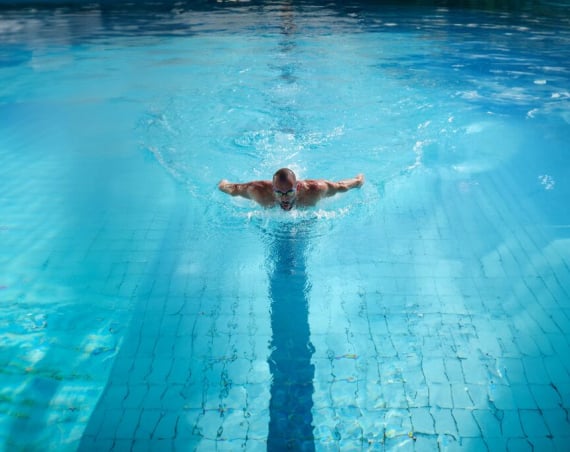To play in international tournaments, players must be prepared to perform through multiple stages of competition. With games played regularly over 4 weeks, football is a game of endurance. The key to staying at the top of their game all the way to the finals: Smart training and recovery strategies.
We spoke to former England team forward, and record goalscorer, Kelly Smith about preparing for intense exercise, prioritising recovery and how players stay sharp over the course of a football tournament.
Whether you’re a football fan or a player yourself, read on for tips on how to train and recover like a pro footballer.
How do you prevent fatigue over the course of a tournament?
As a tournament progresses, the physical demands and pressure to perform well increases. According to Smith, strategies for preventing fatigue start with a manager, coaching staff and medical team that works to manage each player’s workload. “We use GPS tracking vests to the keep track of the demand placed on each player during training and matches,” explains Smith. “With that information, position-specific training plans are tailored to each player individually so those players where the physical demands are higher (full-backs and midfielders) will have plans that are different to positions that require lower physical intensity.”
How important is rest between fixtures and training? Which are the best forms of rest?
Rest is as vital as a training session and is crucial to being in the best possible physical condition. “We completed daily urine tests and filled out a form to help sports science and medical teams gauge the physical and mental wellbeing of each player by tracking things like hydration levels and sleep levels,” says Smith. “We were advised to stay off our feet on rest days. I liked to spend my time doing quizzes, catching up on Netflix and going for coffee with team mates to switch off and relax.”
In an international tournament, what kind of training schedule do you have?
According to Smith, training during a tournament tends to be light. “We spend most of our time focussing on tactics, team shape, walkthroughs and set pieces. This allows for recovery and less stress on the body.” Substitutes and squad members who haven’t played the most recent match will do a more intense session to keep up-to-date and on a similar level to those who have played.
What do you do to keep focussed during the days between matches?
Competing in a major tournament is the dream and reason for putting in so much hard work. That said, being as prepared as possible for each opponent is the key to staying focussed. “For me, it’s more about trying to take my mind off the pressure, intensity and scrutiny that a major tournament brings and finding a balance between being focussed and relaxed so I’m ready to perform,” says Smith.
Are there any methods of preventing injury that are important through a tournament?
Stretching is an essential way to avoid injuries all year round. According to Smith, some players like to do a gentle warm up on an exercise bike to get their legs moving and their blood pumping before a match. “It’s important to take what works for you at club level into tournament and not do anything too drastic,” says Smith. “We do team yoga sessions to keep the team flexible and supple to help prevent injuries. We also use TheraBands for stretching and adding a bit of resistance to warm up exercises.”
Is there any gym equipment you use in your recovery?
“Using the gym during a tournament is more about general maintenance work rather than anything too drastic or goal-driven,” says Smith. “It’s important to keep the body ticking over and to maintain a level of fitness. We’ll focus on upper body strength and avoid doing anything too taxing with the lower body as legs need to remain fresh for matches.” Smith also recommends using foam rollers to help remove lactic acid and stretch out your muscles.
We have seen images of footballers using pools in the training/recovery. What is this for?
Swimming is an active form of stretching and is low impact so puts very little stress on the joints. It works almost all muscle groups and can help to reduce muscle soreness and inflammation. “Swimming is also fun and encourages a sense of togetherness in a more laid-back environment than the gym or training pitch,” says Smith.
Are there any David Lloyd facilities that are particularly good for post exercise recovery?
According to Smith, a whirlpool like the ones in the spa facilities at David Lloyd Clubs is a gentle way to ease muscle soreness, promote relaxation and help you switch off mentally. Footballers generally avoiding the steam room or sauna prior to a game because it’s important to maintain hydration levels.
What are the biggest myths about recovery?
The idea that ice baths don’t work is a myth. Smith says ice baths can change the way blood flows through the body and flush away lactic acid and metabolic waste, making them a great tool in aiding recovery. “It’s horrible, but it feels great afterwards and is both physically and mentally refreshing.”
Is it true that most of the players will be carrying little niggles once deep into a tournament?
“Not everyone. A handful of players will be managing injuries, and there are always small impact injuries that happen during a game or training session that can be quite painful,” says Smith. “Plans are constantly made to manage this and get players into shape – massages and ice baths are both important for relieving muscle tension and easing swelling and bruising.”
How does nutrition play a part in recovery after training or a game?
Smith confirms that proper nutrition is a huge factor both before and after a game. “I tend to eat a major meal the evening before a game that is packed with carbs. Generally, I choose something that includes pasta, chicken, and vegetables. I also have a lighter meal 2-3 hours before the game – again with plenty of carbs and protein to provide enough energy for the entire game.”
“After a game, players tend to have a protein shake or snack right away. There’s an important 2-hour window after exercise where it’s vital to replenish hydration levels and muscle glycogen stores. It’s common to not feel like eating straight after a game but it’s an important step in recovery.”
How does sleep play a part in recovery?
According to Smith, adrenaline can make it difficult to sleep after a game. “I often find myself reliving moments in the game in my head and it’s hard to switch this off to fall asleep.” But she emphasizes that it’s important to get at least 8 hours of sleep to properly recover, refresh mentally and give the body time to repair. If you don’t sleep enough, your muscle tissue becomes weaker and more susceptible to tears. Motor skills, concentration and decision making are all affected if you don’t get enough sleep. It’s so important that pro footballers track their sleep to ensure they are getting enough to continue to perform at their best.
With so much pressure on modern footballers and some negativity coming from social media, how do you block it all out and keep your mind strong and focused on the goal?
“Some players come off social media to block out hype and negativity, others like to read through and find out what people are saying – they’ll often use this as extra motivation. It’s generally down to the individual.”
How do you look after your mental wellbeing generally during a tournament?
“I like to talk to family and friends and stay connected. It can be intense so it’s important to stay grounded and step away from the hype that can surround a tournament,” says Smith. Psychologists are also available to players for personal one-on-one sessions or “unit sessions” to help them find the right frame of mind before and after games.
Want to get your kids involved in playing football? David Lloyd Clubs has several kids’ programmes and clubs. Find out more our programme of kids football classes today.
David Lloyd Clubs have a wide range of facilities from places to train but also the perfect environment for relaxation and recover.
Find a club



